Boris Johnson wasn't Cummings' puppet, Raab says
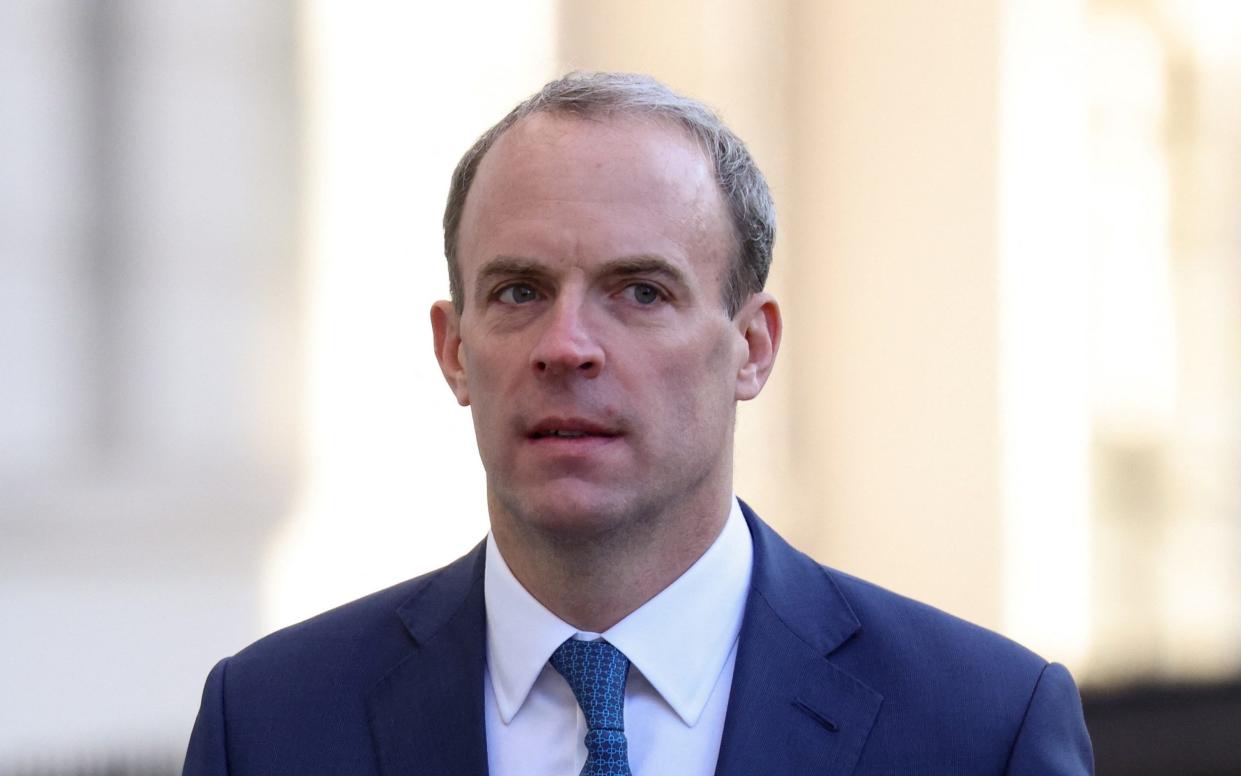
- Oops!Something went wrong.Please try again later.
- Oops!Something went wrong.Please try again later.
- Oops!Something went wrong.Please try again later.
- Oops!Something went wrong.Please try again later.
Dominic Raab has rejected the accusation that Boris Johnson was a “puppet” in Downing Street being led by Dominic Cummings.
The former deputy prime minister was responding to questions on accusations made by Sajid Javid in which he said Mr Cummings was prime minister “in all but name”.
Mr Raab told the inquiry: “The broader question you raise about whether... Boris Johnson was a puppet, I’m afraid I don’t find that a serious allegation. I think Boris Johnson certainly relied on his senior advisers, by the way I think you have to if you’re going to get through the work, particularly in a pandemic.”
He added: “I just don’t accept the characterisation that there was some sort of puppet regime.”
05:00 PM GMT
The Inquiry has ended
The enquiry has finished for the day and will resum at 10am on Thursday.
04:54 PM GMT
Raab insists government was mindful of mortality rates
When the issue of mortality rates and lockdown fatigue was raised by the Inquiry lawyer, Dominic Raab said the government relied on an evidence based approach to the easing of restrictions.
Mr Raab said: “We relied on the evidence as we had it at the time. Of course we are mindful of that.”
He said Covid deaths, NHS capacity, social impacts and economic impacts were the four main issues he was focused on.
04:36 PM GMT
Raab given 'five minutes notice' before taking charge when Johnson was ill
Dominic Raab told the Inquiry he was given five minutes notice before taking on the role as acting prime minister when Boris Johnson was ill with Covid.
Mr Raab said: “I was effectively really told on five minutes’ notice.”
He said he was informed after coming out of a press conference and that his priority was to “steady the ship”.
04:03 PM GMT
A lot was 'fluid' early in the pandemic, says Raab
When asked if the UK locked down too late, Dominic Raab said it’s easy to view things in hindsight.
Mr Raab said it was “for the committee to decide” adding the situation was “fluid” in the early stages of the pandemic.
03:40 PM GMT
Pictured: Dominic Raab
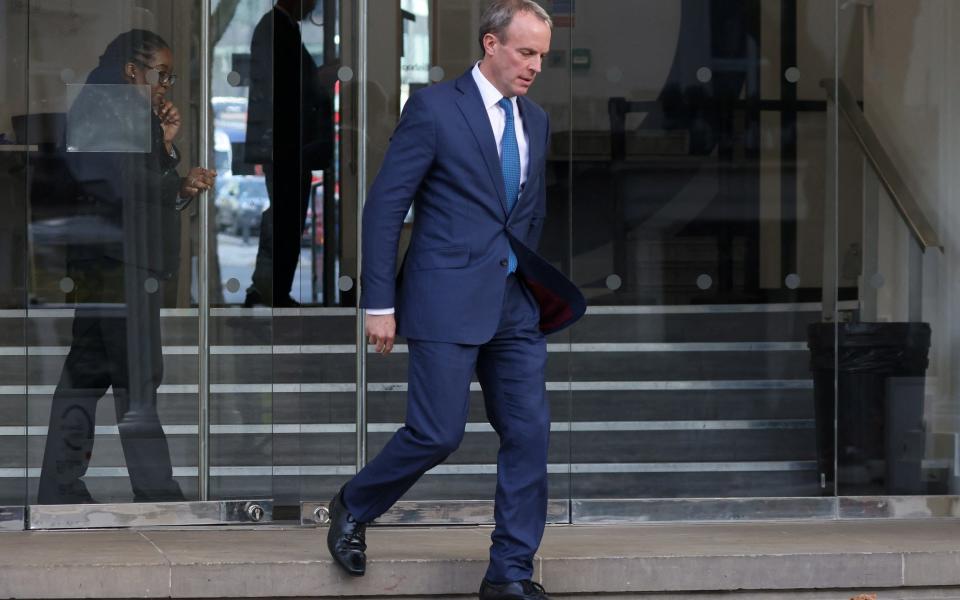
03:37 PM GMT
Boris Johnson demanded 'workshy' staff return to office
Boris Johnson demanded “workshy” staff return to the office as he battled to reopen the country post lockdown.
The prime minister insisted he wanted “all the malingering work shy people” back in the office, an extract from Sir Patrick Vallence’s diary shown to the Covid Inquiry revealed.
“We can’t have the bol----- of consulting with employees + trade unions. They need to all come back to work,” Mr Johnson was recorded as saying.
Commenting on the numbers of civil servants back at work, Mr Johnson was also said to have remarked: “How would you be able to tell?”
Mr Johnson also asked “are we going to continue this bol-----?”, in a tense meeting with Cabinet ministers and scientists in July 2021 about reopening the country.
03:30 PM GMT
Baroness Hallet addresses concerns of Inquiry bias
Following questioning about the role and influence of Dominic Cummings in Downing Street, Baroness Hallett addressed possible concerns of bias in the Inquiry.
She said: “Can I just issue another assurance as I did yesterday. When we look into the toxic atmosphere, it’s not some lurid interest that we want to hear rude words or anything, it’s to see whether there was anything wrong with the decision making process and that’s why we are asking the questions.”
Mr Raab responded: “I understand and totally respect it but I want to give the best evidence I can and make sure we understand where we have political noise and where we have political issues.”
03:13 PM GMT
Raab disagrees that Boris Johnson was a 'puppet' in Downing Street
Dominic Raab said he did not agree with the accusation that Boris Johnson was a “puppet” in Downing Street being led by Dominic Cummings.
The former foreign secretary was responding to questions on accusations made by Sajid Javid earlier today, in which he said Mr Cummings was prime minister “in all but name”.
Mr Raab told the inquiry: “The broader question you raise about whether... Boris Johnson was a puppet, I’m afraid I don’t find that a serious allegation. I think Boris Johnson certainly relied on his senior advisers, by the way I think you have to if you’re going to get through the work, particularly in a pandemic.”
He added: “I just don’t accept the characterisation that there was some sort of puppet regime.”
03:09 PM GMT
Cummings in No 10 to drive decisions, says Raab
When asked about Dominic Cummings’ role within govenrment, Dominic Raab said: “He was there to driver forward decisions and to try to take a step back from daily events of the day and look at things more strategically.”
Mr Raab added that Mr Cummings tried to synergise different departments in government and sense check policy.
02:46 PM GMT
Quesitoning of Sajid Javid has finished
Questioning of Sajid Javid has finished at the Covid Inquiry, and Dominic Raab is now being sworn in.
02:44 PM GMT
Downing Street 'at war' with No 11 over Omicron
Number 10 and Number 11 Downing Street were “at war” as Omicron hit the UK in late 2021, Sir Patrick Vallance recorded in his diary.
In an entry read out at the Covid Inquiry, the former chief scientific adviser wrote on November 26: “No 10 meeting PM very down about new Variant. Exasperated. Afterwards, No 10 says they are at war with No 11 + that anything Javid says they assume is wrong. They say they are missing Gove.”
Sir Patrick also recorded that then-deputy chief medical officer Jonathan Van Tam had told him he had “never seen Nervtag (New and Emerging Respiratory Virus Threats Advisory Group) so rattled”.
Asked whether he was aware of issues between Number 10 and Number 11 on Covid, Sajid Javid told the inquiry: “Not specifically. On most things my experience was that Number 10 and Number 11 at that time moved together.”
02:23 PM GMT
No perfect time to relax restrictions, says Javid
When asked how much long Covid was considered when relaxing lockdown restrictions, Sajid Javid said the impact was “well understood by me and key people making decisions including the prime minister’s office”.
He added: “What the government was trying to do was take a balanced approach.”
But Mr Javid conceded there was “no perfect time” to remove restrictions.
02:12 PM GMT
Evidence face masks can protect against Covid still uncertain, says medical chief
The evidence around the use of face masks in community settings is still uncertain, the head of the UK Health Security Agency told the Covid Inquiry.
Prof Dame Jenny Harries also questioned the Government’s advice on the use of homemade face coverings during the pandemic, the inquiry heard on Wednesday.
Read the full story here.
02:00 PM GMT
Dominic Cummings was prime minister in 'all but name', says Sajid Javid - watch live
Dominic Cummings was Prime Minister in “all but name”, Sajid Javid told the Inquiry.
The former chancellor resigned in February 2020 because of the behaviour of Mr Cummings, who he said “sought to act as the prime minister in all but name”.
Speaking to the Inquiry, Mr Javid said: “I would say that as my time as chancellor, I considered that he sought to act as the Prime Minister in all but name and he tried to make all key decisions within No 10 - not the Prime Minister.
“I felt that the elected prime minister was not in charge of what was happening in his name and was largely content with Mr Cummings running the Government. I did not think that was right and that was why I ultimately resigned.”
He added: “On the day of my resignation, I told the Prime Minister that Mr Cummings was ‘running rings around him’ and ‘would not stop until he had burnt the house down’”.
01:07 PM GMT
Inquiry breaks for lunch
The Inquiry has stopped for lunch and is due to resume at 2pm.
12:55 PM GMT
Level of dysfunctionality 'not experienced before', says Javid
Dysfunctionality in No 10 in early 2020 was not something Sajid Javid had ever experienced before, he told the Inquiry.
When asked about Boris Johnson’s Downing Street operaiton compared with other administrations Mr Javid had served under, the former chancellor said: “It was different in my experience and, obviously, I can’t speak to you about other governments.”
He added: “Certainly, I think the the extent of dysfunctionality was something I had not experienced before in any government.”
12:49 PM GMT
Downing street 'dysfunctional', says Javid
No 10 was “dysfunctional” in the months leading up to the pandemic, Sajid Javid told the Covid Inquiry.
Asked by counsel Joanne Cecil if he was aware of a “toxic” or “dysfunctional” culture in Downing Street in early 2020, he said: “Broadly, I think it was a widespread feeling amongst a lot of the political advisers working in No 10, many ministers, that the No 10 operation collectively was quite dysfunctional.
“I think many ministers had noticed who really seemed to be making a lot of decisions.”
It comes after Mr Javid told the probe he resigned as chancellor due to Boris Johnson’s chief adviser Dominic Cummings seeking to act as prime minister “in all but name”.
Referring to his resignation in February 2020, Mr Javid said he recalls other No 10 advisers, including Helen MacNamara, telling him the “prime minister is only doing this because of Dominic Cummings”.
He added: “‘Don’t fall for it, Sajid’, was their message. That Dominic Cummings will be gone within a few weeks, there’s no way he can survive the way he’s going on.”
12:31 PM GMT
Requests made in Johnson's name without his knowledge
Mr Javid said it was not unusual for his private office to get a request from the prime minister’s office or No 10, but found many requests were not coming from Mr Johnson “once probed”.
“They might be anything from a request for information, request for detail, but also for policy change, or policy preference,” he added. “On probing further, they would be coming from Mr Cummings.”
Mr Javid said he would eventually see the prime minister and talk with him, both formally and informally, asking “I heard that you wanted this or you wanted that”, but Mr Johnson “would sometimes just not even know that that request had come in his name”.
He cites an example of when he was working on the budget in January and February 2020.
“I was getting a lot of requests relating to the budget, which on probing were coming directly from Mr Cummings and not the prime minister, and it’s not something I would have expected,” Mr Javid told the inquiry.
“Although that was the first time I’d served as chancellor, I had been in the Treasury as both economic secretary and the financial secretary under George Osborne when he was chancellor. So, I had a bit of a sense about how I would have expected things to work and this was very unusual.”
12:08 PM GMT
Pictured: Javid questioned at Covid Inquiry
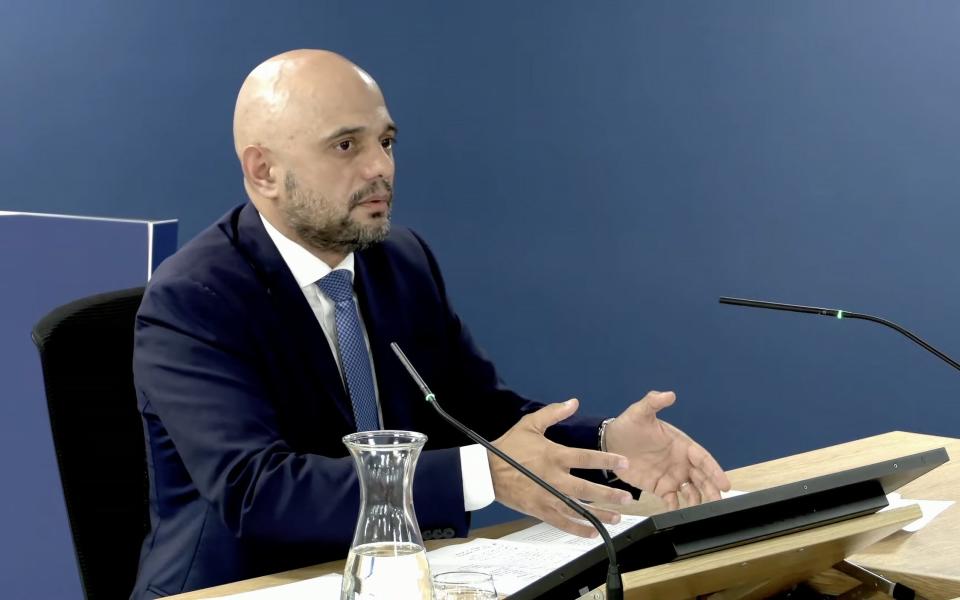
12:06 PM GMT
Cabinet designed to 'place Cummings and PM as decision-makers'
Sajid Javid said Boris Johnson’s Cabinet was designed to “place Dominic Cummings and the prime minister as the decision-makers”.
The former health secretary said in his written evidence, shown to the inquiry, that the team in No 10 in January and February 2020 were “well versed in the affairs of government outside of a crisis, and I can imagine that may have caused difficulties during the pandemic.”
He added: “My view is that the Cabinet was designed to place Dominic Cummings and the prime minister as the decision-makers. The goal was to centralise power in No 10 with a preference for loyalty over experience.”
Mr Javid told the inquiry that many of the key decisions were being made by Mr Cummings, and not the then prime minister.
11:53 AM GMT
Javid: I will never fully understand scale of grief suffered
Sajid Javid told the Covid Inquiry he will “probably never fully understand” the scale of the grief suffered by those who lost loved ones during the pandemic.
“Sadly, many people lost their lives and many of their loved ones are still grieving,” the former health secretary said.
“I know some of them are here today as well. I will probably never fully understand the scale of their grief but I sincerely hope that this inquiry gets to the bottom of what happened in our country at the time and that as a country, we learned lessons from it so that if there is another pandemic, we are just so much better prepared.”
11:46 AM GMT
Sajid Javid sworn in at Inquiry
Sajid Javid, the former secretary of state for health and social care, has been sworn in at the Covid Inquiry and is now being questioned.
11:31 AM GMT
Questioning of Prof Harries has finished
Prof Harries has been dismissed from the Covid Inquiry. Earlier the UK Health Security Agency chief said evidence for the effectiveness of face masks is “still to some degree uncertain”.
Dame Jenny Harries told the Inquiry in her written evidence that the initial position by the WHO and scientists was that the use of face coverings for people who did not have Covid in community settings was “unlikely to have a significant impact and was not recommended”.
She said there was a growing emphasis on the use of face masks as a “precautionary tool”, and goes on to say in her witness statement: “The evidence base for their use in community settings was and still is to some degree uncertain.”
11:24 AM GMT
Harries questioned Government advice on homemade face coverings
Prof Harries questioned the Government’s advice on homemade face coverings during the pandemic.
The Government issued guidance on how to make face coverings from a t-shirt - a single layer of fabric - and how to sew one while inserting an extra layer of fabric inside.
The Covid Inquiry was shown how Prof Harries, who was deputy chief medical officer for England at the time, queried the May 2020 guidance saying that she thought both methods “were ineffective”.
She told the Inquiry: “The evidence at the time said at least three layers. The reason I said I think it’s ineffective was because the only evidence I think we had at the time was around three layers ... if (the guidance) said ‘three’, I’d have said, ‘okay, but make the guidance consistent’”.
Prof Harries said the document was sent to her in May when the World Health Organisation was yet to recommend the use of face coverings, adding: “Maybe I was a little bit annoyed, I can see in the tone there where there wasn’t a clear policy and yet I was being sent a document to sign off something which I didn’t think was very evidence based, but that was not an infrequent occurrence.”
11:14 AM GMT
Email does not suggest positive patients into care homes was 'fine', says Harries
Professor Dame Jenny Harries said an email sent in March 2020 about the possibility of discharging Covid positive patients to care homes was a “high-level view of what was coming over the hill” and should not be read as her saying that such a move was “fine”.
The UK Health Security Agency chief told the Inquiry: “My message on the 16th ... this was a look ahead and think ‘this is what will happen in due course’, it doesn’t give a timeframe.
“You should not take my email as to say ‘the NHS is suddenly going to discharge lots of Covid-positive patients and that’s absolutely fine’.
“What it was doing was painting a picture to the person who was contributing to policy on the official side at the Department of Health.”
She added: “I’m really keen to emphasise my email was a high-level view so people were aware of what was kind of coming over the hill, but the hill was still a little way away.”
11:09 AM GMT
Harries rejects there was 'some degree of equanimity' about dischraging Covid patients to care homes
Prof Jenny Harries has rejected suggestions there was “some degree of equanimity” about discharging Covid positive patients into care homes.
It comes after the Covid Inquiry was shown an email to a Department of Health and Social Care civil servant from Dame Jenny which said the move would be “entirely clinically appropriate” if cases rise rapidly.
Inquiry counsel Andrew O’Connor suggested there was “some degree of equanimity about discharging large numbers or Covid-19 patients into that very vulnerable environment”.
Dame Jenny replied “if I may, I think that’s an interpretation”, adding: “This was a very high-level picture to reinforce, if you like, the position that the country was in at that weekend, and I think we’ve heard that in other places.
“If people were not thinking through what likelihood was in the rising numbers of cases, as we’ve heard, I don’t think we have sensible conversations about managing risks.
“This is not a policy at all. This is a statement of ‘if you have a pandemic in a country, how on earth are you going to manage that exponential rise in cases?”‘
11:01 AM GMT
Pictured: Jenny Harries at Covid Inquiry
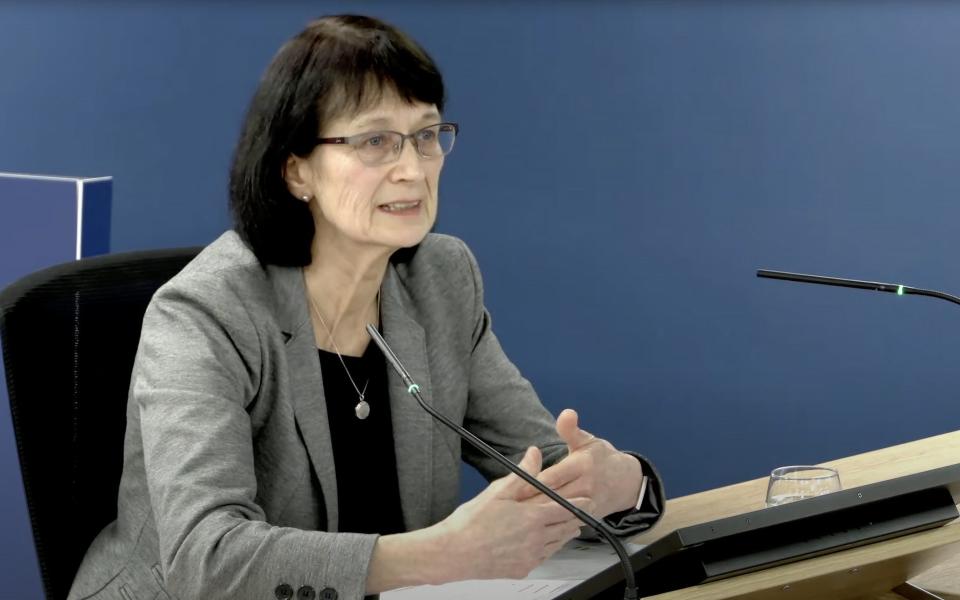
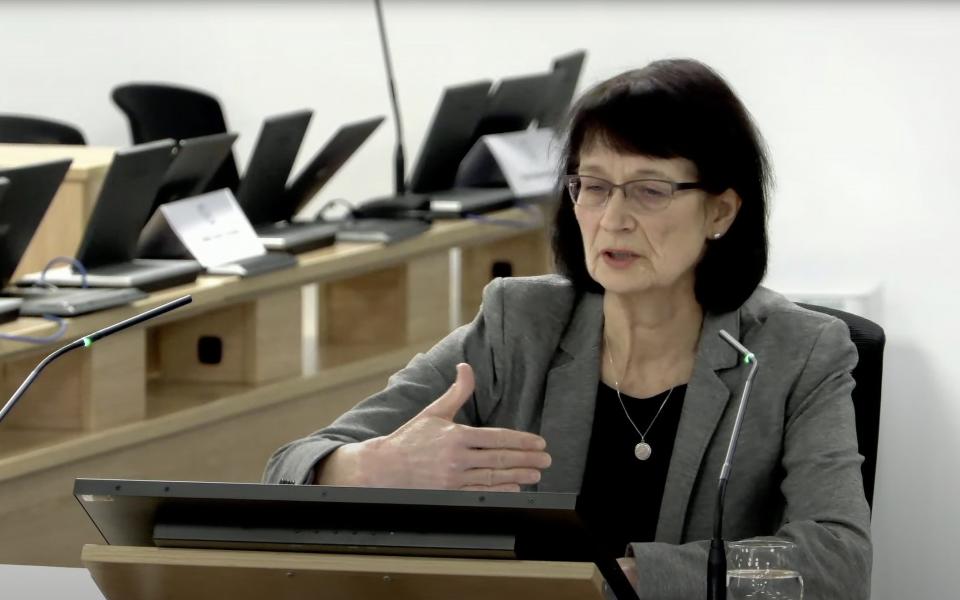
10:55 AM GMT
Discharging Covid positive patients into care homes could be 'appropriate', Harries suggested in 2020
Discharging people with Covid into care homes would be “entirely clinically appropriate” if cases rise rapidly, the former deputy chief medical officer said in March 2020.
In an email to a Department of Health and Social Care civil servant, Professor Dame Jenny Harries said: “Whilst the prospect is perhaps what none of us would wish to plan for, I believe the reality will be that we will need to discharge Covid positive patients into residential care settings for the reason you have noted.
“This will be entirely clinically appropriate because the NHS will triage those to retain in acute settings who can benefit from that sector’s care.”
When questioned about the email at the Covid Inquiry, Prof Harries said it “sounds awful” but was intended to provide “a very, very high level view” of what would happen if there was an “enormous explosion of cases”.
She said: “It was a very bleak picture because I think the reality was this isn’t an invitation to be discharging Covid patients, it’s actually a reality that says if hospitals overflow ... those who are physically well to go will go.”
10:46 AM GMT
Covid Inquiry must question if virus was man-made, says Jacob Rees-Mogg
The Covid Inquiry must question if the virus was man-made, Jacob Rees-Mogg has said.
It comes after Michael Gove told the inqury on Tuesday that the UK was unprepared to deal with Covid and suggested part of the problem could be because the virus may have been “man-made”.
Speaking to GB News, Mr Rees-Mogg said: “The Wuhan lab leak theory was once considered a loony-tune idea, but now it seems to be the most probable source of the virus.
“And now we know that two US agencies, the Department of Energy and the FBI, have concluded with some confidence that the virus originated in a lab. The evidence clearly points to the likelihood that the virus came from a lab.
“If we are to restore public trust in a post Covid world, the question of the lab leak must be at the forefront of the Covid Inquiry and we must also ensure that lockdowns never happen again.”
10:25 AM GMT
Harries raised concerns about imposing severe Covid restrictions too early
Prof Harries raised concerns about imposing more severe Covid restrictions too early in March 2020.
The former deputy chief medical officer cited the risk to adults and children vulnerable to domestic violence that lockdown may pose.
She said calls to domestic violence charities “shot up” as the infection rate started to rise because the public started to understand there might be a lockdown. Prof Harries said her concerns may not have been escalated early enough.
“I didn’t see that coming through in guidance at that time. It was corrected later but personally don’t think it was given significant attention,” she said.
10:08 AM GMT
Questioning has begun
Questioning of Professor Dame Jenny Harries, the former deputy chief medical officer for England, has commenced.
09:42 AM GMT
Pictured: Sajid Javid and Jenny Harries arrive at inquiry
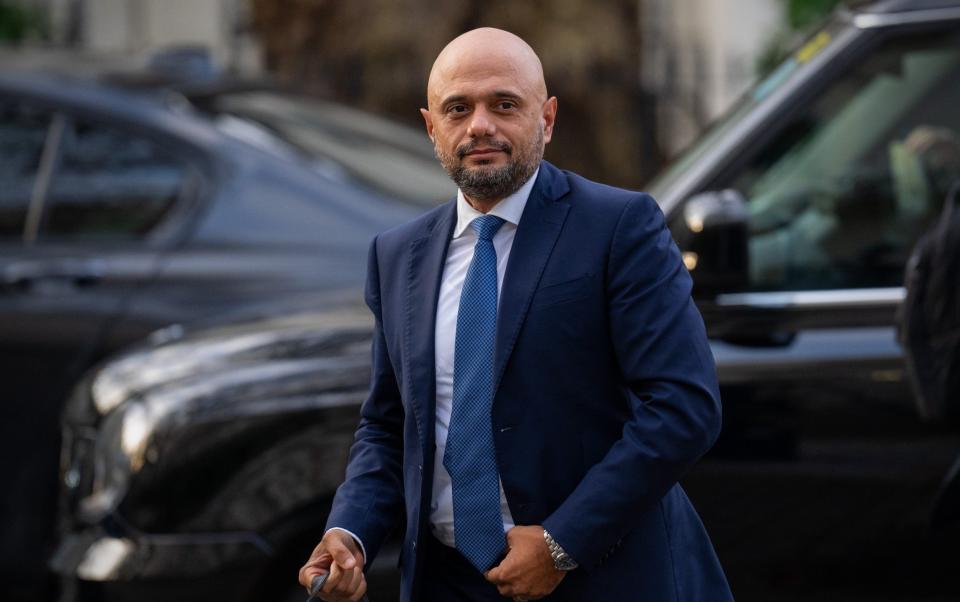
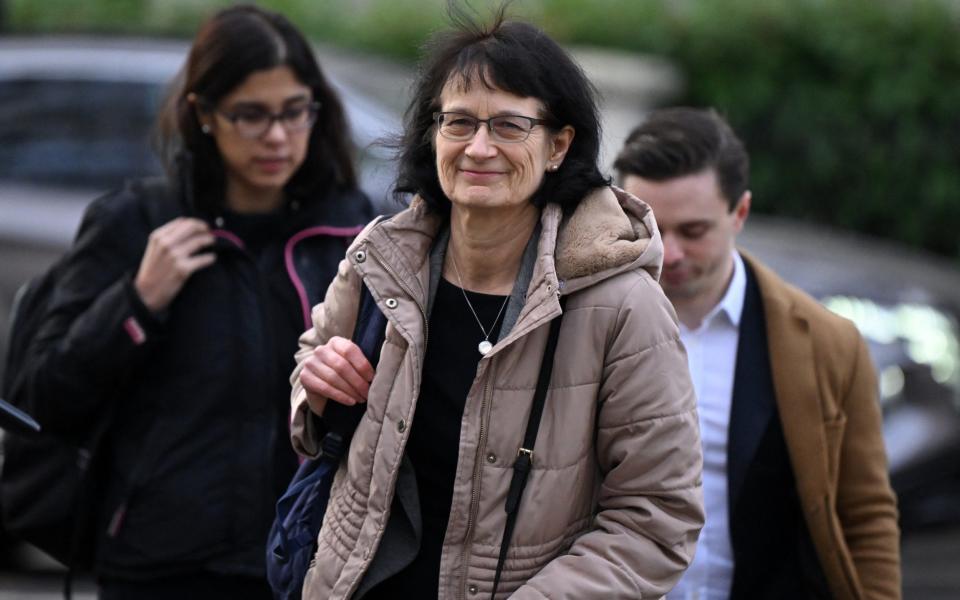
09:38 AM GMT
The possibility Covid is man-made is not a ‘divisive’ issue - the world needs to know
The goal of any inquiry is to learn lessons so a similar calamity can be averted. So it seems oddly short-sighted that the Covid Inquiry is refusing to examine the origins of the pandemic, writes Sarah Knapton.
When Michael Gove pointed out that the Government was unprepared because the virus was so unusual - and possibly man-made - he was shut down by Sir Hugo Keith KC, who said the issue was divisive and “not part of the terms of reference” of the inquiry.
It’s hard to imagine this happening in any other context.
Envisage a scenario where the Hillsborough Inquiry had felt it was “divisive” to examine policing decisions that led to 96 people being crushed to death, or if the Grenfell Tower inquiry had felt cladding was beyond its remit.
Finding out the origins of Covid-19 is crucial. If the virus really was cooked up in a Chinese lab, then we need to know so the world can consider introducing a moratorium on such risky research.
09:37 AM GMT
Recap: We didn’t lock down early enough, says Gove
We didn’t “go early enough and we didn’t go hard enough” on lockdowns, Michael Gove told the inquiry yesterday.
Mr Gove said the Government was “too lenient, too late”, and cautioned against making similar mistakes in the future.
He also suggested Covid may have been “man-made”, while conceding the country was unprepared to deal with the virus.
The former chancellor of the Duchy of Lancaster said: “A significant body of judgement that believes that the virus itself was man-made and that presents sort of challenges as well.”
09:35 AM GMT
Good morning
Welcome to our live coverage of the Covid Inquiry.
Professor Dame Jenny Harries, the former deputy chief medical officer for England, is set to continue giving evidence this morning.
She will be followed by Sajid Javid, the former health secretary, and Dominic Raab, the former deputy prime minister.

